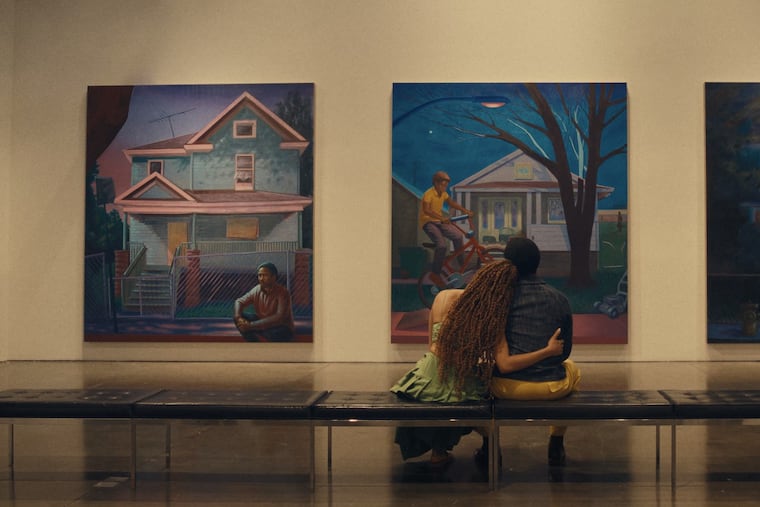Artist Titus Kaphar is leaving his mark on Philadelphia
The artist, who painted a Center City mural, is releasing his debut film. Next month, he will be part of a PMA exhibit.

Back in 2021, artist Titus Kaphar teamed up with Reginald Dwayne Betts to create the mural Declaration, which stands at 150 North Broad Street.
Declaration — a redacted Declaration of Independence superimposed on the face of a young Black woman — was part of the series called the “The Redaction,” which confronted abuses of the criminal justice system.
Humanizing people who have survived the carceral system also forms the spine of Exhibiting Forgiveness, Kaphar’s debut feature film. It’s releasing on Friday, after premiering at the Sundance Film Festival.
In what is almost an autobiography, André Holland plays artist Tarrell who struggles to let his estranged father La’Ron (John Earl Jelks) back into his life, unable to look past La’Ron’s past addiction issues and consequent incarceration that drives a seemingly irreparable wedge between them. Eventually, at the behest of his mother Joyce (Aunjanue Ellis-Taylor), Tarrell realizes the way out of a haunting past is through forgiveness.
Kaphar spent three months training Holland so the actor looked convincing as an artist. He, like Tarrell, is also estranged from his father, Jerome. In 2011, when Kaphar set out to find out more about him, he found prison records and mug shots of 97 men who had the same name as his father. He painted portraits of these men in the style of Byzantine devotional paintings. What emerged was a series called “The Jerome Project.”
“At every point of my career, the work has taken me to another medium,” Kaphar said. He has painted, sculpted, blown glass, and carved wood. “If the only tool you have is a hammer, then everything looks like a nail. If the only language that I speak is that of paintings, every piece of art I make has to be spoken in that language.” With film, Kaphar learned a new language, one that he says, allowed him to “jump the track.”
“I grew up on that side of the track where there are no museums, where we barely have trash pickup … [but] we watch movies over there, and we connect to movies that show examples of us that feel real,” he said of his childhood in Kalamazoo, Michigan. “There are things that you can only say and paint, and I will be painting for the rest of my life. But there are also things that you can’t say and do in painting. One of those things is to tell you what happened before and what happened after. The thing that is beautiful about film is the aspect of time.”
Exhibiting Forgiveness, as it travels through an artist’s childhood, youth, and adulthood, displays a tender picture of love desperately trying to overcome hurt. “I like that the [film’s] name speaks to the exhibition that one has as an artist, but also the delivery of forgiveness, the showing of forgiveness,” Kaphar said. “And from early on in the writing process, it became clear to me that that was the theme of this film.”
It is hardly a surprise then that Ghanaian British curator Ekow Eshun, who was “interested in what artists are doing and thinking about right now,” when curating Philadelphia Museum of Art’s upcoming exhibit, “The Time Is Always Now,” chose to include Kaphar’s art.
But it is not just the now that fascinates the artist who, in the video interview with The Inquirer from his home in New Haven, Conn., sat next to a telescope talking about how the press tour had made him miss seeing the Northern Lights the night before. As much as he is constantly responding to the present, what excites him most about Exhibiting Forgiveness is its future.
Poet and lawyer Betts, who was formerly incarcerated, runs a nonprofit called Freedom Reads, “where he goes into prisons and builds libraries,” Kaphar said. “Dwayne and I are collaborating on screening this film in prisons and detention centers. We recognize that so much of our community is there. Our fathers, at different points in their lives, were there, and Dwayne himself was there. And it’s important that we don’t forget about those folks behind the wall.”
Kaphar is also excited about the future of the art world. He runs NXTHVN, a nonprofit arts accelerator that supports the careers of Black and brown artists and curators. Each year, the program selects seven artists and two curators, providing them with studio space and housing. A key part of the program is that each artist mentors a high school student during their time at NXTHVN.
In Titus Kaphar’s world, the present must bleed into the future, but one must never stop looking at the stars.
“Exhibiting Forgiveness” is playing in theaters all over. Check exhibitingforgivenessfilm.com for more information.
“The Time Is Always Now: Artists Reframe the Black Figure” runs Nov. 9–Feb. 9 at the Philadelphia Museum of Art. philamuseum.org/calendar/exhibition/the-time-is-always-now